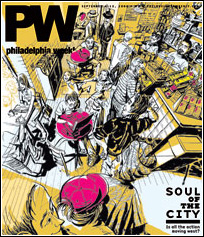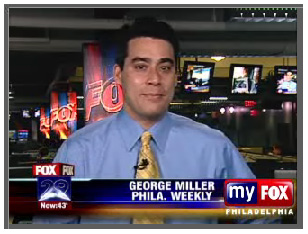The Palahniuk Conversation
The author of Fight Club, Snuff and Choke talks with Philly Weekly about action, his new movie and the art of writing.
From the October 1, 2008 Philadelphia Weekly.
When you write, do you keep a specific audience in mind?
I keep in mind my Thursday night writers group and I keep in mind my editor. Beginning with the Thursday night group, I'm writing for spontaneous reaction and also for understandability - clarity. If I'm going to experiment with a structure - especially a non-linear structure - it's my first place to test it, to see if the workshop can even comprehend it, follow what the story is, if the device or transitions work. So much of my work is the constant search for transitioning devices that will allow me to cut stories the way film is cut, so that I don't have wordy transitions.

You keep a film adaptation in mind while creating the book?
No, but I do keep in mind that film has made readers into a fantastically sophisticated audience. Film takes advantage of that growing sophistication. You know, film is not the film that it was 100 years ago. Books still kind of cling to this 19th century model of storytelling that doesn't give the reader, the audience, enough credit for how smart they've gotten. I want to tell a story in as tight a way as a film tells a story.
Are you surprised by the way people are devoted to your work?
Yeah. I've been surprised by everything. I've been so surprised by everything that I'm starting not to be surprised. The people whose work I've always really, really admired - authors and musicians - I'm meeting them and they are now a part of my life. That is just staggering. To do events with Amy Hempel, who was the person we studied, who is really my hero, it's kind of stunning. It's one of those things you really try not to think about too much cause it'll drive you crazy.
You've said that everybody has a dark secret. Do you think your characters aren't as fringe as people think, that most people hide stuff, like sexual addictions?
Number one, they've got to be interesting. And I just find that these more extreme characters that are constantly taking action are just more dynamic. There's an aspect of wanting to pass my time writing about something interesting, someone constantly doing something.
Do you think everyone has something deeper within them than what they put out?
I think that people ... uh ... how to put this? Everybody, very early in life, discovers a way of being that they learn endears them to other people. But there's a point around 33 years old, 36 years old, when you realize that's not going to work for you forever. My characters tend to be more dynamic because they're reaching that point in their lives where their old way of being is breaking down. They're conflicted by the idea that they don't know what's next. You could call it Kierkegaard's leap of faith, when you get tired of sort of reinventing yourself on a very superficial level. Or you could call it getting in touch with your own mortality. My characters tend to be more dynamic because they're characters that are reaching that crisis.
Did you go through this yourself?
At the age of 31, I realized, "Oh my God, I may die like everyone else." And I can't do everything. I'm not going to be able to do everything I wanted to do in life. In fact, by trying to do everything, I've got nothing done. So how about I spend the rest of my life trying to write one really great sentence. Every day, if I try to write one great sentence, I'm all done.
I heard that you ran into someone today who wore a wedding dress to one of your events?
Yeah, he wore a wedding dress at the Library, one of a couple hundred people, men and women, who wore wedding gowns to the event. They got prizes and I sent them presents afterwards for having worn them. Every year, I try to find some sort of device that's going to make it some sort of spectacle so that I can trick myself into having a good time.
Are your books a commentary on the role of men in society?
I'm always trying to write about a general human behavior that's based on verbs, on people constantly taking action. I tend to try to have a lot more gesture and action or physical business in the story than actual dialogue. Dialogue is about the last thing I go to.
Why is that? Isn't the act of speaking action.
It is, but I think it's the least efficient means of communication. There was some landmark UCLA study done in the late 60's, I have it all at home, but something like 85 percent of communication that happens between people happens to be based upon posture, gesture, body language. And something like 15 percent was based upon volume and tone of voice. Only five or seven percent occurred with words. I always try to keep dialogue to a minimum because its more fun to communicate through the immediacy of gesture. Verbs allow you to communicate a story in a much more converged or involuntary way for a reader. The verbs allow you to come in under the radar, below people's defenses.
You seem like such a placid soul and here you are talking about action all the time. Are people surprised when they meet you?
Disappointed. They want a personification of the kind of chaos I depict. Meeting authors is kind of the death of the characters. That is always heartbreaking.
There is definitely a very strong commentary about man's role in society in your books. Do you think that the role of men has changed?
If you want to associate a certain aggressive, lawbreaking type of behavior with men, you could do that. We value people who obey the laws but we make rich the people who don't obey the laws. We're supposed to be good but we don't reward good. We reward bad.
Where do you get your inspiration?
Any story that resonates with me, that is sort of shocking, that I'm unable to forget them. There are so many sweet, funny, ultimately heartbreaking stories. I visit people on Sundays - it's my day of socializing, visiting people in their homes. I always visit this married couple, Tammy and Matthew. They had this really stinky cat that they got when they got married 14 years ago. In the spring they had to put the cat down because the found the cat had diabetes and was stinky and they were tired of giving it two shots per day. They wanted to start traveling again, so they were going to have to kill Petey, their cat. But the next week, they still had Petey. So I was talking to Matthew and he says, "Since Petey got sick, we had to feed him this Science Diet stuff and it only comes in these big, $200 bags. We've got half a bag left. Petey's not dying until he eats all that food." So this bag becomes a sort of hourglass of Petey's life. And every time I visit, they still have Petey. One day, when Tammy's out of the room, I ask Matthew, "What's up?" And Matthew says, "It would just kill Tamm to kill Petey, so I got a secret bag. Whenever the bag in the kitchen starts to get empty, I sneak some more food into into the big bag." The next week, I was kind of teasing Tammy, "The bag's lasted a long time." With Matthew out of the room, Tammy says, "It would just kill Matthew, so I got a secret bag that I keep in the bedroom and whenever the big bag gets empty, I fill it." It's a true story but it resonates with the Gift of the Magi, people doing something secret for each other out of love.
When you speak with people, are you constantly generating ideas, thinking about what you can do next?
I'm listening with the idea that if I don't monopolize the conversation, they're going to present me with something extraordinary that could never have come from my own experience, something completely precious, terrific. All I have to do is keep asking questions about it and they will unpack it in the most marvelous way.
Do you pursue ideas? How did you begin attending support group meetings?
The original support group meetings came from when I was first working at Freightliner, when I was paying my student loans back. I couldn't get a job in journalism and I was really thinking, "My life's gone to hell. I have all this money I owe and my life's not going to work out. Now, I've got this sucky, horrible job I hate and I'm such an idiot. My life is over." I got so desperate, I started going to church, trying to find some redemption. One day, they had this Christmas tree with tags on it listing good deeds you could do. One was, "Take a hospice patient on a date." The idea was that you would go to a hospice and take one of the dying patients on an outing. I ended up volunteering at this hospice and I would take people to these support groups full of people dying of the same condition. I would have to sit with them in the basements of these churches so I could take them back to the hospice. But as I sat with them - all the people dying of whatever, they would all assume I was dying of what they were dying of. There was no diplomatic way to explain that wasn't the case. As I sat there in incredible discomfort, with all these people presenting their deaths to each other, I started to fantasize about somebody who would go to these things to feel better about their own life.
You didn't actually participate?
No, I just kept quiet. The person who I brought would know the truth. But even that person wouldn't be able to diplomatically say, "Chuck doesn't have melanoma. He's just a tourist. He's just here to take me back." It would violate their confidentiality to have one person there who wasn't in the same situation.
How many different support groups did you attend?
Before Fight Club, maybe five or six different conditions - organic brain dementia, the perpetual HIV/ AIDS groups, tuberculosis, there was a group of people with hepatitis waiting to get livers - and they would always die before the got livers. I could probably think of more of them.
(Choke star) Sam Rockwell attended sexual addiction meetings as prep for the movie?
Before they started filming Choke last year, he went to Sexaholics Anonymous with (fellow Choke actor) Brad William Henke because they wanted to experience this culture of people making their confessions. They wanted to see the ritual of it. In a way, these groups are like a Catholic mass. People go and make their confessions and they are heard and redeemed. Then they're accepted back into community. In Catholic mass, you are given the host. But in 12-step recovery groups, you get a chit, which is very much like a host. It's a tangible thing that looks just like a host. There is so much ritual and Sam and Brad wanted to sit in on that.
You talked about finding a role in life as a child and living within that role because people will like you. Do you feel like people have an expectation of what a Chuck Palahniuk book or movie is supposed to be? Are you stuck in a role now?
I do what I want to do. The next book is written in this fantastically, over the top pidgin language. I just sat there with a thesaurus and looked up every inappropriate word that I would never use. The book is really about how people scan for the verbs. Going through the workshop process, I realize how people just wait for the verb.
What was the inspiration for that?
I went to Germany last year on a tour. I studied German for a while when I was young. I can understand a little by listening for the verbs. I was doing an interview in German and I meant to say, "I'm sorry that I've forgotten so much of my German." And instead what I said was, "I'm so sorry that I've gassed so many Germans."
How did they react?
The publicist said after that, "No more German."








